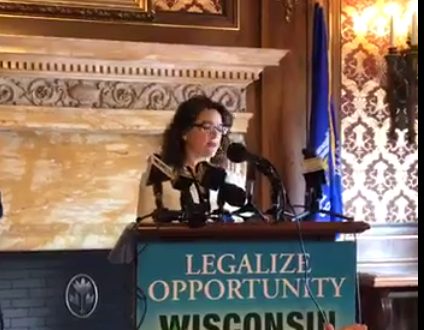State Representative Melissa Sargent (D-Madison) hosted a press conference at the Wisconsin State Capitol today to announce LRB-2457, legislation to legalize marijuana in Wisconsin.
“I’m super excited to be announcing a bill today that fully legalizes recreational as well as medicinal marijuana in the state of Wisconsin,” Sargent said. “This bill is so much more than legalizing marijuana — it’s about legalizing opportunity and prosperity. The state budget was due two weeks ago, and Wisconsin simply can’t afford to wait any longer — we deserve a real plan to create new jobs and stimulate our lagging economy, and that’s what this bill is.”
LRB-2457’s introduction comes nearly two weeks after Republicans failed to meet the July 1 state budget deadline and following several stalled budget negotiations between Assembly and Senate Republicans and Governor Walker. This is the third time a bill to legalize marijuana has been introduced in the Wisconsin State Legislature since Sargent introduced the first bill of its kind in Wisconsin during the 2013-2014 legislative session.
“’Business as usual’ is simply not cutting it. We need to start thinking about new, innovative ways to jumpstart our economy. Wisconsin has a billion-dollar budget deficit, Republicans have no real ideas for fixing our transportation fund, and Scott Walker still hasn’t created the 250,000 jobs he promised six years ago,” Sargent explained. “Meanwhile, in Colorado, legalizing marijuana generated $2.4 billion in economic activity and created more than 18,000 new jobs in a single year alone.”
Sargent is a Representative in the Wisconsin State Assembly, representing the 48th Assembly District, which covers the east and north sides of the city of Madison and the village of Maple Bluff. The bill she introduced today includes several changes from legalization bills introduced during previous sessions including providing employment and benefit protections for marijuana users, requiring insurance coverage for medicinal marijuana for terminal illnesses, and incorporating marijuana into current alcohol and tobacco educational curricula in schools. The bill also treats marijuana as an agricultural product, requiring the Department of Agriculture, Trade and Consumer Protection to conduct periodic inspections and to promote best practices for producing, harvesting, and packaging. Previous efforts to legalize marijuana have also never received a public hearing nor had a single Republican cosponsor.
“I know, and you know, that the most dangerous thing about marijuana in Wisconsin is that it remains illegal,” Sargent said. “Our budget crisis in Wisconsin is destined to worsen. Folks, we need to do something. And we continue to see new evidence to support the economic benefits of the legalization of marijuana, so it’s even more unjustifiable and even more foolish to not legalize marijuana in the state o Wisconsin.




























